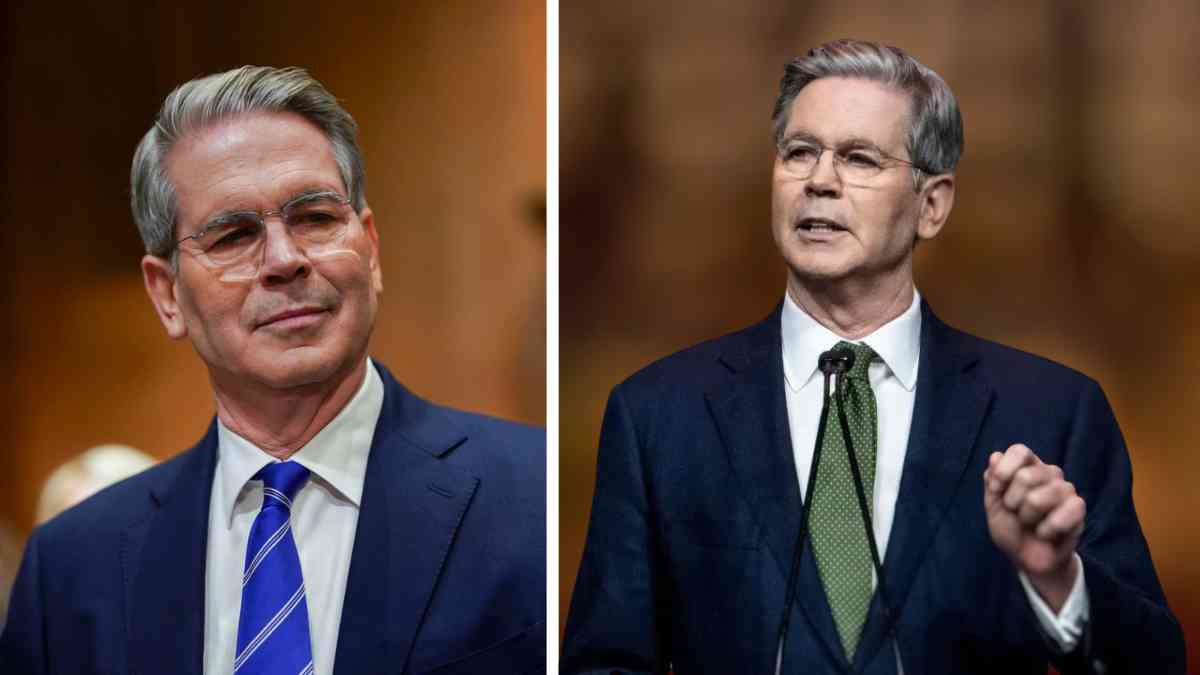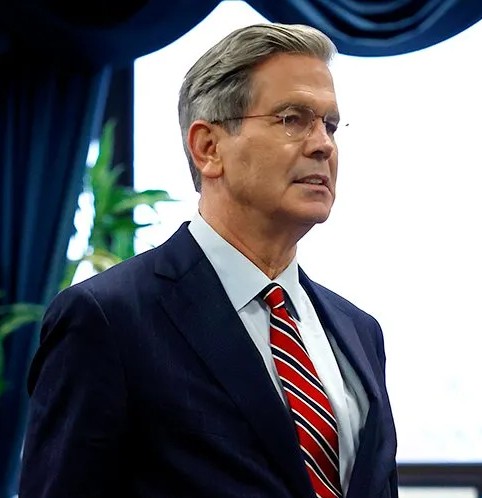Scott Bessent: From Wall Street Maverick to Treasury Secretary
The Strategic Mind Behind America's Financial Future

In the ever-evolving world of finance and politics, few names resonate with such a potent blend of investment prowess and public service as Scott Bessent. A respected hedge fund manager and now the 79th United States Secretary of the Treasury, Bessent’s trajectory from Yale graduate to a key player in Washington encapsulates a rare fusion of private sector acumen and national leadership. His journey is not just one of personal achievement, but of shaping macroeconomic trends, influencing global financial markets, and now, steering the economic policies of the United States.
Early Life and Education

Scott Bessent was born on August 21, 1962, in Conway, South Carolina. Growing up in a small Southern town, Bessent exhibited intellectual curiosity and leadership qualities from an early age. These attributes followed him to Yale University, where he earned a degree in political science in 1984. While at Yale, Bessent served as editor of The Yale Daily News and led the prestigious Wolf’s Head Society, signaling his blend of academic rigor and social influence.
The Launchpad: Entry into Wall Street
Bessent’s career began with roles at Brown Brothers Harriman and Kynikos Associates, both formative experiences that helped build his foundational understanding of market mechanisms and financial systems. However, his defining early career move came when he joined Soros Fund Management (SFM) in the early 1990s. There, he quickly made his mark.
Black Wednesday and Early Fame
In 1992, Bessent was part of the elite team at SFM that executed one of the most iconic trades in financial history: betting against the British pound. This move earned the firm over $1 billion and played a key role in what became known as Black Wednesday. Bessent’s analytical foresight and understanding of global currencies helped cement his reputation as a financial visionary.
Founding His Own Path
After leaving Soros Fund Management in 2000, Bessent launched his own hedge fund ventures, allowing him to craft a distinct investment philosophy. His style remained macro-focused—leveraging global political and economic trends to drive returns. In 2015, he returned briefly to Soros Fund Management as Chief Investment Officer before founding Key Square Group, a global macro hedge fund managing billions in assets.
Key Square Group: Global Vision, Tactical Precision
Key Square Group wasn’t just another hedge fund; it was Bessent’s brainchild—a vehicle that allowed him to apply decades of experience to global markets. His investment strategies combined macroeconomic forecasting with disciplined risk management. The firm attracted high-profile clients and consistently delivered solid performance by balancing aggressiveness with caution.
A Surprising Pivot: From Hedge Funds to Government
In a twist that surprised many, Scott Bessent was nominated by President-elect Donald Trump in November 2024 to serve as the Secretary of the Treasury. His nomination marked a bold departure from traditional public sector picks, bringing in a financial heavyweight with deep roots in the private market.
The Senate confirmed Bessent in January 2025 with a bipartisan vote of 68-29, reflecting widespread respect for his expertise and capabilities. His swearing-in made history: he became the first openly gay person to hold the role and only the second to occupy a Senate-confirmed cabinet post.
Leading the Treasury in a Time of Challenge
Scott Bessent assumed his Treasury role during a period marked by high inflation, looming debt ceiling crises, and global tensions, particularly surrounding Ukraine and Russia. Yet his approach has been defined by composure, data-driven decision-making, and an emphasis on market stability.
He quickly convened meetings with key congressional leaders—the so-called “Big Six”—to discuss pressing fiscal issues, including tax reform, debt management, and trade policy. His ability to synthesize complex economic information and translate it into actionable policy has garnered praise across the aisle.
A Global Diplomat in Financial Strategy
Beyond domestic concerns, Bessent has played a crucial role in navigating international economic relations. He has not ruled out the possibility of readmitting Russian banks into the SWIFT system, a strategic position that underscores his belief in financial diplomacy as a pathway to peace.
His conversations with European and Asian financial leaders have positioned the U.S. as both a moral and economic leader on the world stage. Rather than using sanctions and restrictions solely as punitive measures, Bessent advocates leveraging financial systems to build cooperative relationships.
Market Sentiments and the “Bessent Effect”
Under Bessent’s watch, markets have shown mixed but generally stabilizing trends. While critics question some of his Wall Street-influenced perspectives, many acknowledge that his deep understanding of market psychology helps preempt volatility. The so-called “Bessent Effect” describes a phenomenon where investor confidence rises when he issues public statements or policy clarifications.
Unlike predecessors who may have leaned heavily on traditional economic modeling, Bessent blends financial intuition with real-time data analytics. He has introduced more agile policy frameworks to the Treasury, supporting both immediate crisis response and long-term planning.
Personal Values, Public Vision
Openly gay and unapologetically authentic, Scott Bessent brings a refreshing transparency to his role. He speaks with clarity, avoids political doublespeak, and often draws upon his experience in high-stakes investing to discuss risk, return, and accountability. His personal journey—as someone who thrived in elite financial circles while remaining true to his identity—adds a compelling human dimension to his public persona.
He is a staunch advocate for financial inclusion, pushing for initiatives that improve banking access in underserved communities and modernize federal financial systems through technology and decentralization.
Navigating the Debt Ceiling and Tax Reform
One of Bessent’s most pressing challenges is managing the national debt. With deadlines approaching for raising the debt ceiling, Bessent has engaged in strategic negotiations with both Democrats and Republicans to ensure fiscal continuity. His approach involves both revenue enhancements and spending reviews, aiming to strike a delicate balance between austerity and economic stimulus.
Simultaneously, he is spearheading efforts to reform the U.S. tax code. His proposals emphasize closing loopholes, incentivizing innovation, and ensuring the wealthy contribute their fair share—drawing on lessons from decades of observing capital flow behaviors.
Modernizing the Treasury Department
Bessent is also pushing for internal reforms within the Treasury Department. His plans include:
- Integrating AI and machine learning into economic forecasting.
- Upgrading cybersecurity frameworks to protect financial data.
- Streamlining taxpayer services for better accessibility.
These initiatives are part of his broader goal to make the Treasury more efficient, responsive, and equipped for the digital age.
Criticism and Controversy
No public figure operates without critique, and Bessent is no exception. Some progressives fear his Wall Street background may bias his policy decisions in favor of financial elites. Others argue that his global investment perspective is exactly what America needs to stay competitive.
Bessent has responded with characteristic calm, emphasizing transparency and outcomes over ideology. His actions thus far—particularly his push for inclusive banking and fair taxation—are beginning to quell early skepticism.
Looking Ahead: The Legacy in the Making
Scott Bessent stands at a pivotal crossroads in American economic history. His dual identity as both a market insider and a public servant offers a rare combination of experience and vision. Whether addressing global financial imbalances or reforming domestic tax policies, Bessent is poised to leave a lasting imprint.
His legacy will not be defined solely by market movements or policy memos, but by his ability to bring bold ideas, professional rigor, and personal authenticity to one of the most influential roles in government.
Conclusion
In Scott Bessent, America finds a Treasury Secretary who understands the pulse of global markets and the heartbeat of its citizens. His story is one of brilliance, resilience, and purpose. As economic challenges grow more complex, Bessent’s leadership offers a beacon of strategic thinking and principled action. The coming years will reveal just how deeply his influence shapes not only U.S. fiscal policy but the global financial landscape.
Stay informed, stay empowered—Scott Bessent’s story is just beginning.
FAQs
Who is Scott Bessent?
Scott Bessent is the current U.S. Secretary of the Treasury and a former hedge fund manager. He is widely known for his investment career, including his tenure at Soros Fund Management and the founding of Key Square Group.
What role did Scott Bessent play in Black Wednesday?
Bessent was part of the elite team at Soros Fund Management that bet against the British pound in 1992, contributing to a $1 billion profit during the Black Wednesday currency crisis.
What is Key Square Group?
Key Square Group is a global macro hedge fund founded by Scott Bessent in 2015. It applies economic forecasting and disciplined risk management to international investments.
What are Scott Bessent’s main goals as Treasury Secretary?
Bessent is focused on tax reform, debt management, financial inclusion, and modernizing the Treasury Department with digital tools and better accessibility.
Is Scott Bessent the first openly gay U.S. Treasury Secretary?
Yes, he made history by becoming the first openly gay person to serve in that position, adding a significant milestone to his distinguished career.



